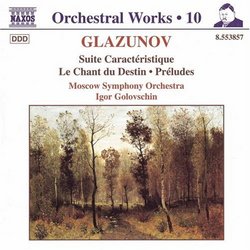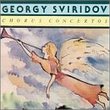| All Artists: Alexander Glazunov, Igor Golovschin, Moscow State Symphony Orchestra, Moscow Symphony Orchestra Title: Glazunov: Suite Caractèristique; Le Chant du Destin; Préludes Members Wishing: 0 Total Copies: 0 Label: Naxos Release Date: 7/20/1999 Genre: Classical Styles: Forms & Genres, Symphonies, Symphonies Number of Discs: 1 SwapaCD Credits: 1 UPC: 730099485722 |
Search - Alexander Glazunov, Igor Golovschin, Moscow State Symphony Orchestra :: Glazunov: Suite Caractèristique; Le Chant du Destin; Préludes
 | Alexander Glazunov, Igor Golovschin, Moscow State Symphony Orchestra Glazunov: Suite Caractèristique; Le Chant du Destin; Préludes Genre: Classical
|
Larger Image |
CD DetailsSimilar CDs
Similarly Requested CDs
|
CD ReviewsInteresting works well performed, but...... David A. Hollingsworth | Washington, DC USA | 08/08/1999 (4 out of 5 stars) "Allow me to start with the main course: the Suite Characteristique (1884-1887). Alexander Glazunov composed this work along with the Second Symphony and Stenka Razin. These works share some common traits, the orientalism & nationalism linked to the ideals of the Russian Five, the youthful confidence in orchestral writing & form, and impeccable taste for somewhat distinctive melodies & charm surrounded by passion and a sense of heroism. The Intermezzo scherzando's trio section reminds one of the Scherzo movement of Borodin's Third Symphony whereas the Danse Oriental has the exoticism to be found later in the scores of Serge Vasilenko (his Balalaika Concerto), Ippolitov-Ivanov, and Khachaturian. The Elegie has a sense of tragedy & passion in it before the Cortege takes over with exhuberance and optimism. Glazunov's Suite Characteristique does measure up to the Suite Characteristique (Suite no. 2) of Tchaikovsky, although Glazunov's work is more variational, drawing it closer to Tchaikovsky's Third Suite (1888). Le Chant du Destin (Song of Destiny) of 1907 & the Two Preludes (1906 & 1908) were later endeavors of the composer. The "Song of Destiny" is a dramatic overture using a motive of Beethoven's Fifth symphony. It is a well composed work with some interesting passages, although not among his stronger pieces. The Preludes nos. 1 & 2 were composed in memory to Vladimir Stasov & Nikolai Rimsky-Korsakov respectively. Stasov was a very important man in the history of Russian music. As a historian and music & cultural critic, Stasov was responsible for giving operatic projects to Mussorgsky, Borodin, and others based primarily on russian history. We therefore have Russian operas of historical even legendary proportions. The Preludes were heartfelt tribute to the men who were instrumental in shaping Glazunov's career & reputation.The performances of Igor Golovschin and the Moscow Symphony Orchestra were well done with a certain degree of passion and intimacy. Only his former senior associate Yevgeny Svetlanov with the USSR State Symphony Orchestra played with greater passion & excitement of these works. The major drawbacks include slow, dragging tempos and lack of enough sonorities. Take Le Chant Du Destin for instance. It is a dramatic overture no doubt shorter than the composer's major symphonic poems, such as "Stenka Razin", "The Sea", "The Forest", and even "Karelian Legend." Yet, Golovschin dragged the performance time to 19 minutes of this piece whereas Antonio D'Almeida & the Hong Kong Philharmonic played it under 11 minutes, with a sense of urgency & more excitement and drama. The Intermezzo Scherzando of Suite Characteristique as well as the Preludes were also performed with slower tempos than they should. The Intermezzo scherzando will sound more exciting & festive if performed under six minutes. The performances were, again, passionate. However, Svetlanov had the upper hand in performing works out of admirations of the works & of the composers, especially of Glazunov, resulting with unmistakably upmost intimacy, enthusiasm, & commitment. I do not feel that way when hearing this disc even for the second time. Also refinement is questionable in few places. It is important to realize that the type (or level) of performance influence the perceptions giving to a certain piece. Although Golovschin and his ensemble represent these works well and with good enough intentions, Svetlanov and even D'Almeida outshined him due to the passion & urgency involved. Recommendable, but with some reservations."
|

 Track Listings (11) - Disc #1
Track Listings (11) - Disc #1









